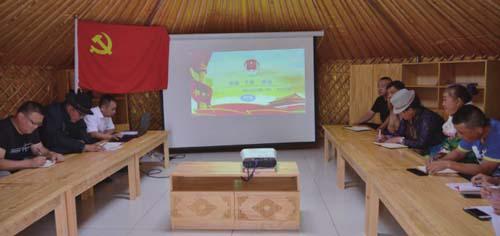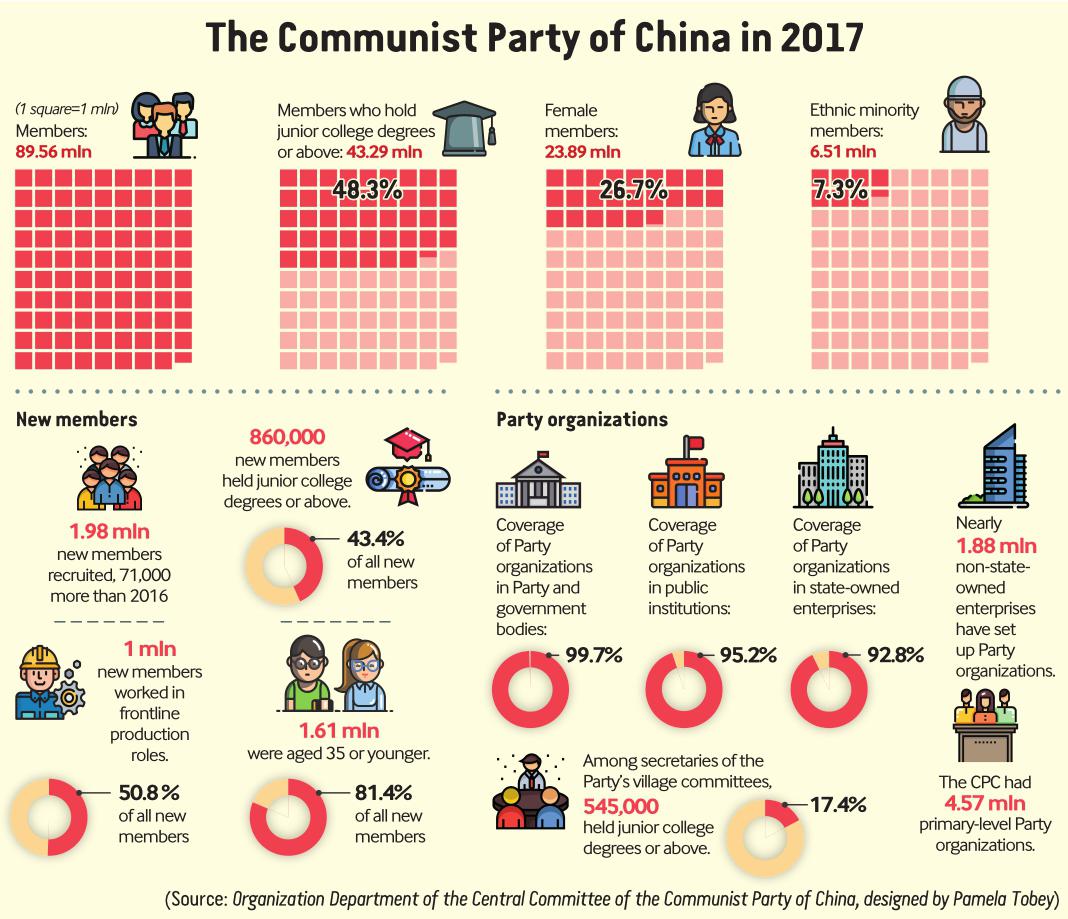Fountain of Youth
2018-07-30ByLiNan
By Li Nan

For the past six decades, most members of the Yang family have celebrated their 20th birthday in exactly the same way: by becoming a member of the Communist Party of China (CPC).
Grandfather Yang Benren, a veteran from east Chinas Jiangsu Province, became a member of the CPC in the 1950s. Thirtythree years later, his son, Yang Zhong, joined the Party as a college student. And this year, Yang Benrens granddaughter, Yang Wendi, followed in their footsteps by joining the worlds largest political party on June 20, two days before her 20th birthday.
Joining the Party was always Yang Wendis dream. Born into a family of CPC members, she grew up hearing about the Party. “I got to know about the CPC and its ties with the people when I was young. I longed to be one of them,” Yang Wendi told Beijing Review.
On her first day at Nanjings Southeast University in September 2016, her grandparents gave her a special gift: the Party Constitution. “Your grandfather joined the Party aged 20. So did your parents. Your grandmother, uncle and aunt are also Party members,” her grandfather Yang Benren wrote on the last page. “My grandfather wanted to inspire me with the Party Constitution, hoping that I would develop a proper worldview and set of values during my formative years,” Yang Wendi said.
That same month, Yang Wendi applied for Party membership. “It was a decision taken of careful consideration. Although my whole family is in the Party, it was my own decision to apply for membership. No one could make that decision but me.”
As a student, Yang is not alone in joining the Party. In 2017, the CPC recruited 1.98 million new members, 71,000 more than 2016. Among these new recruits, 35.3 percent were students and 860,000 held junior college degrees or above, accounting for 43.4 percent, while 81.4 percent, or 1.61 million, were aged 35 or younger. By the end of last year, the total number of CPC members reached 89.56 million, according to the Organization Department of the CPC Central Committee on June 30, the eve of the Partys 97th birthday.
Vigor and vitality
According to Xie Chuntao, Deputy Principal of the Party School of the Central Committee of the CPC, strengthening primary-level Party organization construction, improving the virtue of Party members, highlighting Party building, complying with Party discipline and optimizing the Partys governance are the key to the CPCs vigor. Xie outlined these ideas in his bestseller—Why and How the CPC Works in China—published in 2011.
Establishing Party organizations at the community level across all walks of life is one effective way in which the Party can grow, Xie said in his book. According to the Party Constitution, a Party organization should be established in a primary-level work unit where there are three or more full Party members. “The Party keeps the country and society well governed through extensive and well-organized primary-level Party organizations,” said Xie.
By the end of 2017, the CPC had 4.57 million such primary-level Party organizations. The presence of Party organizations in Party and government bodies reached 99.7 percent, 95.2 percent in public institutions and 92.8 percent in state-owned enterprises. Nearly 1.88 million non-state-owned enterprises have also set up Party organizations, according to the Organization Department of the CPC Central Committee.
The Partys vigor and vitality have been strengthened, according to the department.“Student Party members are like new blood injected into the CPC, keeping the Party vigorous,” said Yang Wendi.
While presiding over a group study session of the Political Bureau of the CPC Central Committee on June 29, Xi Jinping, General Secretary of the CPC Central Committee, noted that the CPC must regard political building as the Partys fundamental focus so as to provide an important guarantee for the Party to maintain its success. “If a Marxist political party loses its integrity in politics, there will be no morality and virtue in the Party,” Xi said.
Party members receive training to deepen their understanding of the Partys theories and policies. Soon after joining the CPC, Yang Wendi took part in a five-day training exercise in Jinggangshan, one of the cradles of the Chinese revolution in east Chinas Jiangxi Province, in early July. “Joining the Party is a starting point rather than an end in its own right. As a newcomer, I need to absorb new ideas and theories of Party building to enable myself to make more contributions to the country and the people,” Yang said.
Self-discipline
Party discipline is also crucial to the CPCs success. The anti-corruption campaign of recent years is one of the most important ways through which the Party can retain its integrity. From 2012 to 2017, according to the Supreme Peoples Procuratorate, authorities investigated 120 “tigers,” corrupt officials at the provincial level or above, including Zhou Yongkang, a former member of the Standing Committee of the Political Bureau of the CPC Central Committee, prosecuting 105 including Zhou. A total of 62,715 “fl ies,” low-ranking offi cials guilty of corruption, were also charged. A poll conducted by the National Bureau of Statistics in 2017 showed that 92.9 percent of those surveyed were satisfied with the outcomes of the antigraft campaign, 17.9 percentage point higher than in 2012. On June 29, Xi called for renewed efforts to combat corruption so that the Party can stay true to its original mission.??
Since its establishment, the Party has continued to optimize its methods of gov- ernance. “In order to uphold and develop socialism with Chinese characteristics in the new era, our Party must have the courage to carry out self-reform and make itself stronger,” Xi said at a national conference on organizational work in Beijing on July 4.
No matter how its governance strategies evolve, the CPC remains true to its original aspiration and mission to seek happiness for the Chinese people and rejuvenation for the Chinese nation, said Ding Bin, a professor with the Jilin Provincial Party School. “The Party has retained its original aspiration while daring to revolutionize itself,” he told Beijing Review.
Xi also stressed that upholding the authority and centralized, unified leadership of the CPC Central Committee is essential to adhering to the Partys political leadership. “The whole nation follows the Party, and the whole Party follows the CPC Central Committee. This is how the CPC unites all forces in China and accomplishes things that other countries and parties cannot. It is also the key for the lasting vigor of the CPC,”said Yan Shuhan, a professor with the Party School of the Central Committee of the CPC, in a recent interview with Xinhua News Agency.
